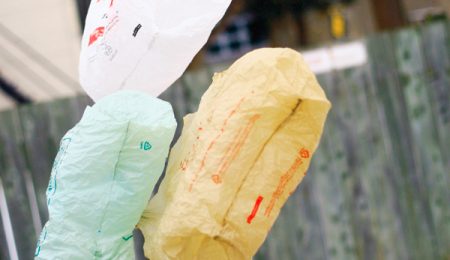Can the journey to sustainable living begin with just one individual?
Ali Schwabe | Fulcrum Staff
Illustration by Mathias MacPhee
THE UNITED NATIONS’ Intergovernmental Panel on Climate Change (IPCC) warned in 2007 that hurricanes and other storms were likely to become stronger as a result of global warming produced by human activity. Recently, hurricane Sandy wreaked havoc on the northeastern United States and Canadian provinces from Ontario eastward. The CBC reported that climate scientists say Sandy wasn’t necessarily caused by global warming, but the storm’s severity and course can be partially attributed to the rising sea levels and warmer ocean surface temperatures caused in part by global warming.
SEE ALSO: Going green, one bread crust at a time [Blog]
The IPCC predicts that sea levels will rise by another 18 to 59 centimetres by the end of the century if warming continues. It also predicts that floods and droughts will become more common, less fresh water will be available for human consumption, diseases like malaria will spread, and ecosystems will change.
But what does all this have to do with you? You’re just one person, and in the long run, it won’t make much of a difference whether or not you recycle the paper you’re holding—right? The Fulcrum sat down with experts and students to find out if it’s possible for individuals to make a meaningful impact on the environment.
Small changes can add up
“I don’t think one person makes a difference at all, because the rest of society is going to do what it wants,” said Emily Steele, a fourth-year nursing student at the University of Ottawa. “I recycle, I turn off my lights most of the time, and I try to do little things like that because I don’t want to contribute to a problem, but I don’t think one person actually makes a difference for the better.”
Some of the experts working toward increasing environmental sustainability are frustrated with the mentality that one action performed by one individual doesn’t make a difference.
“One person doesn’t think they can make a difference—it’s not true,” explained Jonathan Rausseo, the University of Ottawa’s sustainability development manager. “You’re not a person, you’re a [part of a] fabric of people, and if the fabric of people [is] willing to make small differences, it has huge impacts. That little gesture that seems like it’s meaningless—just walking out of a room and turning off the light seems meaningless—but the other 20 million people that did the same thing that you just did, that makes a difference.”
Merissa Mueller is a fourth-year environmental studies and geography student at the U of O. She’s tired of people skipping out on small acts because they think it won’t help that much anyway.
“The people that think they cannot make a difference frustrate me the most,” she said. “To me, it’s simple math. 1+1+1+1+1=the population of our campus, the population of Ottawa, etc. The difference is made by each individual working separately but together [to lessen] our impact on the environment.”
Rausseo offered some concrete examples of individual actions adding up.
“The Ontario Power Authority can install a smart thermostat, and when it gets super hot they up it a half a degree … based on distribution demands across the province,” he explained. “Most people would say ‘Oh, it’s meaningless, it’s half a degree.’ But half a degree over a million homes—that’s a lot of energy. Once you do that it’s enough to stop things like … that blackout we had a few years ago.”
Rausseo further elaborated on programs happening at the U of O. Previously, residence buildings did not have recycling bins inside individual rooms. He shows how the impact of a student getting and using a blue bin is significant when you consider the multiplier effect.
“Inside our residences, let’s say [students] recycle over the course of a week 10 things, that’s reasonable,” said Rausseo. “People are in residences for 30 weeks. So 10 items, 30 weeks—that’s 300 things that are getting recycled a year. There are 3,000 people in residences, so now we’re talking about 90,000 items that were recycled [rather than thrown out].”
Nicholas Rivers, professor at the Graduate School of Public and International Affairs at the U of O, explained that individual actions can have positive, possibly unforeseen impacts as well.
“It goes without saying that most of us aren’t going to turn the global environment around on our own, but individual action can still be important,” he wrote in an email to the Fulcrum. “For example, most of us are followers. When we witness someone else taking an action, it can induce us to change the way we behave. This has been the case for recycling programs: there’s evidence that suggests that many of us have been influenced by a friend or neighbour to begin recycling. That friend or neighbour therefore didn’t just change his or her own behaviour, but also that of others. By taking an action to protect the environment, we may be beginning a shift in social norms that pays off in ways that aren’t reflected by the individual action on its own.
Seeing the system
Not all the experts agree. Matthew Paterson, a professor at the U of O’s school of graduate studies, is a lead author for the IPCC and has written several books on global environmental politics. He argues that individuals have less control over their greenhouse gas emissions than many people think.
“If you just take your domestic emissions—the things you can directly impact in your personal life, say your domestic emissions in your house or your apartment, your transport decisions, the things you buy—from computers to washing machines, even the paper you buy—when you total that up and you look at those emissions and then you ask, ‘Which of these emissions do I actually control or have any significant control over?’, it’s a relatively small amount,” Paterson said.
Paterson believes individuals are forced to make decisions by the ways cities and systems are set up.
“Let’s take your transport choices. Lots of people, especially in North America, don’t have real choices… The choices are so skewed in favour of driving a car,” he explained. “The single biggest difference is not whether you drive a Prius or whether you drive a Hummer. It’s whether you drive or you don’t drive. As soon as you’re driving, you’re infinitely emitting more than somebody that doesn’t drive.”
Mueller acknowledged that a lack of control puts some limits on how she can help the environment.
“I, like many students, rent an apartment. This means I have no control over the residence in which I live,” she said. “I cannot turn down the heat and opt for a sweater; I can’t pay to install energy-efficient windows or low-flow toilets or sinks.”
Leslie Shiell is an economics professor at the U of O whose research focuses on environmental economics. He believes that when governments provide incentive, individuals will change their behaviours in big enough numbers to make an impact.
“I can’t answer that question,” he said when asked if one individual’s environmentally friendly acts matter. “We do know, however, if we put in policies that make it costly for people to harm the environment, then everyone has an equal incentive to take steps to protect the environment.”
He described the effects of the British Columbia carbon tax put in place in 2008.
“A carbon tax … makes all [those] fossil fuels more expensive. Now there’s an incentive for individuals to do their personal calculation and consume less of these polluting inputs simply to make their own selves better off,” Shiell explained. “So now they don’t have to think about the environment from the global sense or from the good citizen sense, it’s just about saving themselves money.”
Paterson believes that even when people want to make good individual choices, their surroundings—the systems and institutions they interact with on a daily basis—limit their abilities to reduce greenhouse gas emissions.
“To the extent that driving is not a choice and is more or less a forced necessity, the system is determining those emissions, not the individual behaviour. Which is not to say that we can’t be encouraging people to cycle, but the way we do that is by building more compact cities… You look at the transitway and say we want every [new] building to be built along the transitway for the next five years until it’s all built,” explained Paterson. “Then you’ll reduce emissions per person. And it’s not because anybody’s any [more] virtuous. And it’s not because you’ve told people what they have to do. It’s because you’ve structured the city in such a way that that’s the sensible thing to do. The sensible thing to do is to jump on the transitway.”
Despite Mueller’s circumstances as a student that limit how much of her emissions or waste she controls, she believes there are still ways for her to make meaningful impacts on the environment.
“It’s tough, but it is possible to maintain some semblance of environmental consciousness,” she said. “I let it mellow. Seriously, do you know how many litres [of water] a conventional toilet uses to flush? It’s ridiculous! Until I have enough money and my own place to buy a low-flow toilet, I’ll be letting it mellow.”
Student lifestyles
When it comes to leading a green lifestyle, there are certain advantages and disadvantages to being a student.
“I cannot afford to purchase all organic food,” said Mueller. “I certainly cannot afford all sweat-shop-free and Canadian- or American-made clothing.”
“Being green costs more money,” agreed Steele. “For example, changing out the light bulbs the landlord installs into energy-efficient light bulbs costs you more money. Students can’t always afford being green, even if they want to.”
The University of Ottawa and the Office of Campus Sustainability have begun a number of initiatives to make student life greener. Rausseo described some advantages students have in leading a green lifestyle.
“If you go to any of the food service outlets, you get 25 cents back every time you use a mug,” he said. “If you drink five coffees a week, you’re getting back $1.25 a week; let’s say you’re on campus for 30 weeks, then you just made $40. The cost of the mug was nothing. Enjoy the $40.”
Rausseo also emphasized that you can recycle absolutely anything on campus.
“The new sports field was made from recycled running shoes. We take your stuff and we actually do something with it,” he said. “On campus we’ve gotten almost as far as we can possibly get with the infrastructure. There are recycling centres everywhere now and the recycling centres have an amazing setup that makes [them] easy to understand and to use, with pictures [and] colour-cod[ing]. And we do recycle it all. Students see cardboard being thrown together in a bag with trash and think it’s not being recycled—it is. We sort it again later. So it’s education now that is our focus.”
Mueller takes full advantage of those systems.
“At home, I recycle everything I can in the mainstream city program and compost on top of that,” she said. “Then I bring my ‘odd plastics’ to campus and recycle them here. [My roommates and I] end up producing a kitchen-size garbage bag of things that can’t be recycled every three months.”
Paterson described additional choices students have.
“If you’re a student living on a central city campus like [the U of O], then you’re relatively privileged; you actually have real [transportation] choices,” said Paterson. “You can cycle, you can walk, you can take the bus, [or] you can drive.”
Mueller thinks some decisions can be controversial but beneficial.
“With the mandatory U-Pass or banning of bottled water on campus—it’s the things that spark outrage among students but also help plant the seeds of behavioural change,” she said. “After you complete university, you may be more familiar with the bus system and opt to use it or continue to carry around a reusable water bottle without a second thought.”
Concrete and creative actions
So what’s a person to do? Regardless of whether or not they focus on individual actions, economics, or governmental systems, the experts all believe there are steps to be taken to ensure we protect our planet for ourselves and for future generations.
One of Mueller’s biggest sustainable choices was vegetarianism.
“In the past year and a half I stopped eating all meat,” she explained. “I’m not a vegetarian simply because I am against animal cruelty but [because] I am conscious of the environmental impacts… If I were to eat meat again, I would need to not be a student as to afford grain-fed, locally produced, free-range, etc. meat—and knowing the farmer would help too.”
Rausseo spoke about ending the disconnect between everyday actions and their environmental impacts.
“If you take an elevator, just you, whether you go up or down, every two floors you go [uses] enough energy to completely power your smartphone. [Take the stairs.] We all need the exercise anyway. Especially if you’re going down. I mean, that’s gravity, come on. You might not necessarily think about it. It’s the disconnect,” he said.
Rausseo’s also on a mission to make the university waste-free.
“Everything is recyclable. Don’t think it’s not,” he said. “We’re going to set up a cigarette recycling centre. Those can be compressed and turned into shipping pallets. Even cigarette butts! There is no such thing as garbage. You’re inventing that in your mind.”
Paterson spoke about changing systems, challenging conventions, and taking a political stance to truly make a difference.
“The first point I would make is look at the sum of emissions and realize they’re not about individual behaviour for the most part; they’re about structural decisions, they’re about city planning, they’re about building codes, transport policy, building architecture… They’re about politics in any other words,” he said. “Acting on those to get those green will be the single most important thing. Get involved in campaigns around the things that cause emissions to be rising, which they still are in Canada.
“I think the second thing is then interrogate the myths that we all have. Do it collectively with your friends; either formally or informally have a conversation about why we love cars and what the problems are of loving cars. We live in a culture that values environmental degradation—that actually thinks environmental degradation is a good thing. That’s the problem,” Paterson continued. “Make the automobile a problem. Make showering twice a day a problem. Make having your rooms the same temperature all year and not wearing fleeces indoors in the winter a problem. Don’t pretend you can do it yourself. It’s not about your moral virtue because none of us really know what to do, we’re all struggling. So make it about a conversation with your friends.”
So, the jury’s out on whether one individual’s actions make a difference. Either way, Shiell has words of encouragement for those on the fence of whether or not they should fully commit to being green.
“[Speaking] as an economist… it may be true that we can solve this problem without that one individual doing anything,” he said. “As a person, I’d like to encourage them to do what they think is right.”





